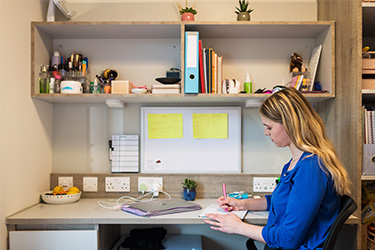Whether it’s a private house shared with others, a flat in purpose-built student accommodation or renting a room within a family home, the paperwork for your accommodation is important to understand.
Tenancy agreements or contracts can look daunting and technical, which is why we’re working with the Students’ Guild as part of the Move Smart campaign to offer you support and resources before you commit to a property.
So what do you need to know?
As a starting point, it’s worth thinking about the answers to a few key questions when looking to secure a tenancy agreement:
- Are you signing an individual or joint tenancy agreement?
- What would happen with the rent payments if one of your flatmates suddenly dropped out of the University?
- What does the landlord commit to doing and what is your responsibility?
- Are bills included?
- How often do you have to pay and do the timings of the payments align with your student maintenance loan?
What’s likely to be included in my paperwork?
Although it can seem confusing, it is important to read through everything to fully understand what is expected of you. Normal things to receive include:
- Your Tenancy Agreement (known as your ‘Contract’)
- Inventory – A list of property, goods, furniture and contents
- Guarantor forms – If you don’t reach the minimum financial requirements of an agent or landlord
- Application forms
>> Find out more details about paperwork on the Move Smart webpage
What are the legal requirements?
There is also a range of legal requirements that a landlord or accommodation provider needs to adhere to, including things like checking that a tenant has the right to rent based on their immigration status, or providing tenants with documents like a gas safety certificate or HMO licence.
>> Find out more about prescribed information, right to rent, and guarantor agreements on the Students’ Guild Paperwork webpage.
What advice is there out there?
There are lots of aspects to think about so it really is wise to take your time and read the paperwork carefully, checking anything that you’re unsure about. There are a number of resources available to help, including:
- The Students’ Guild Advice team have helpful videos on their website as well as contacts to help answer questions you may have.
- Contract Checking advice – The Community Law Clinic are offering free contract checking by 3rd year law students which is overseen by solicitors – contact a2jclinic@exeter.ac.uk to arrange for your contract to be looked over before you sign.
- Residence Life Team– make an appointment or go along to one of their events
- Know your rights – Check out the Students’ Guild Housing Rights webpage
Still looking for somewhere to live or people to live with?
Don’t worry! Taking your time in your search for accommodation after your first year is definitely a smart move to make sure you make the right choice.
- Studentpad is a great free site to search for properties and contact with other students looking for a group of people to live with.
- Come along to one of the Flatmate Finder Events with the Students’ Guild, Residence Life Team and Community Engagement Officers on 5th December, 18:30 – 19:30 in Devonshire House Level 1. Talk through any questions you might have with the teams and chat with other students also on the search for accommodation.
Hopefully this blog will help you navigate through the paperwork element of finding new accommodation so that you can get back to looking forward to planning your move to somewhere new.
The Accommodation team

